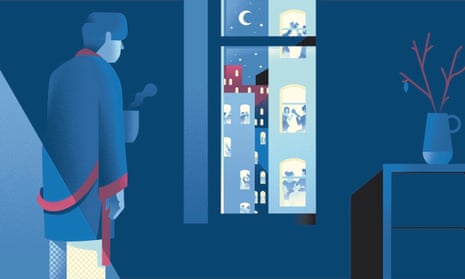Psychologists are regularly berated for spending their workdays reaching blindingly obvious conclusions about the world – an accusation that isn’t entirely unwarranted. (My favourite recent finding comes from the journal Psychological Science: “Depressed individuals may fail to decrease sadness.”) At first glance, it’s tempting to respond that way to a new study from the University of British Columbia, explaining why people tend to assume that their friends have more friends, and lead less solitary lives, than they do. Can you guess? That’s right: because every single time we see our friends, they’re socialising. By definition. Assuming you don’t spy on your friends via telescope from treetops, you never see them at home alone in their pyjamas, eating pickled onion Monster Munch while watching The X Factor and feeling sorry for themselves. You’re never there when they wake in the dark at 3am, wondering where their lives are headed. Or, likewise, consider those happy throngs you glimpse through the windows of the bar you pass each day on your way home from work: doesn’t it seem like they’re always meeting friends at the bar?
In fact, it’s a mathematical oddity that your friends do have slightly more friends than you do, on average. (Essentially, this is because people with large circles of friends are more likely to have you as a member of theirs.) But the main culprit, this new study confirms, is an observability bias. The more instances of something we encounter, the more significant we naturally assume it to be – and though we encounter our own solitude frequently, we never encounter other people’s. The distorted judgments we reach as a consequence have real emotional effects, the researchers found, leaving people with lower wellbeing and less of a sense of belonging. So, yes, the fact that we only ever experience loneliness when it’s happening to us is blindingly obvious, I suppose. But blindingly obvious in an almost literal sense: it’s so self-evident, we barely ever see it.
And the bias isn’t limited to loneliness. It’s at the core of impostor syndrome: you assume you’re the only one with a constant inner voice of self-doubt, because you never hear anyone else’s. It’s also probably why other people’s problems seem so much easier to solve than our own: we see only the main features of theirs, in outline, whereas we see every tiny complicated detail of our own, so they seem more unique and therefore challenging.
This bias may be too fundamental an aspect of our experience for us ever to overcome it completely. Still, when faced with almost any distressing problem, it’s worth asking what you might be missing not through stupidity, or error, but because you’re systematically denied certain kinds of information, as a result of being you, rather than anyone else. At the very least, it’s something to ponder on those evenings you so often seem to spend on your own.









Comments (…)
Sign in or create your Guardian account to join the discussion